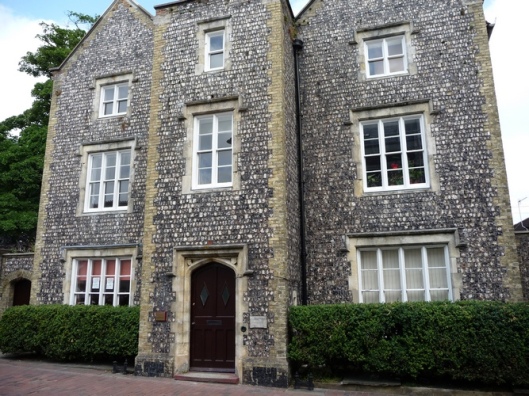Yesterday’s post explored the immediate family of my maternal 9 x great grandfather, Magnus Byne (1615 -1671), Rector of Clayton-cum-Keymer in Sussex. I established that Magnus was the second of six children of Stephen Byne, a yeoman of Burwash, Sussex, and his wife Mary Manser or Maunser. In this post, I want to go back a generation and look at the family of Magnus’ father Stephen, my 10 x great grandfather. Once again, my main source is William Charles Renshaw’s 1913 history of the Byne family of Sussex.
Stephen Byne was born at Mayfield, Sussex, and christened on 3rd July 1586 (in the twenty-seventh year of the reign of Elizabeth I) in nearby Burwash, where he spent the remainder of his life. He was the fourth of seven children of Edward and Agnes Byne. Edward Byne, my 11 x great grandfather, married Agnes, only child of Magnus Fowle of Mayfield by his wife Alice Lucke. I’m intrigued by the family of Magnus Fowle, and not just because he was one of my 12 x great grandfathers. I suspect that it is in honour of him that the name ‘Magnus’ entered the Byne family (though I stand ready to be corrected on this, if a Magnus Byne can be found before this generation). Magnus Fowle, a churchwarden at Burwash, was apparently both a freehold and copyhold tenant of the manor of Mayfield, and Renshaw found evidence of his interest in a number of other properties in that part of Sussex.
Magnus Fowle was the only son of Gabriel Fowle of Southover, Lewes, who died in 1559. From his will, dated January 1554/5, it appears that Gabriel was master of the Free Grammar School in Lewes. The last years of his life coincided with the brief reign of Mary Tudor (1554 – 58), which saw the temporary restoration of Catholicism in England. His will suggests that Gabriel was sympathetic to the old faith. I haven’t been able to track down a copy of the document yet, but according to one source he bequeathed to his parish church his ‘written mass book’ (as the author comments, ‘evidently hidden away in the hope of better times’). The same source adds: ‘Fowle was one of a substantial minority of Lewes testators, amounting to 30% of the total, who now revived the old custom of endowing masses for their souls’. However, Gabriel was evidently aware that there might be difficulty in finding priests: he asked that masses be sung by ten priests ‘if they can be got’.
Gabriel was the son of Nicholas Fowle and Joan Vince, and the brother of William Fowle of Rivenhall, and also of Bartholomew Fowle, the last prior of St Mary Overy, Southwark, before Henry VIII’s dissolution of the monasteries. The prior and canons surrendered to Thomas Cromwell’s commissioners on 27th October 1539.
Although I’m enormously proud of my Nonconformist and Puritan ancestors, I’m particularly pleased, for personal reasons, to have discovered my first pre-Reformation ancestor. Having recently read Eamon Dufy’s The Voices of Morebath, tracing one parish’s experience of the religious upheavals of the 16th century, I’m intrigued by Gabriel and wonder how this ancestor of mine managed to hold on to his traditional faith in such turbulent times.
Another reason for my interest in the Fowle family is that this surname also occurs in my father’s family tree. In 1836 my paternal great-great-grandfather William Robb, a London stationer’s clerk, married Fanny Sarah Seager, who was the daughter of Samuel Hurst Seager and Fanny Fowle. I’m fairly sure that Samuel came from somewhere in the Midlands, but I haven’t been able to find out anything about Fanny’s origins: it’s possible she was descended from the Fowles of Sussex.
Edward and Agnes Byne had six children: Magnus; William; Edward; Stephen (my 10 x great grandfather); John; an unnamed daughter buried at Burwash on 14th August 1590; and James, baptised there on 9th December 1593 and buried on 20th December 1594.
Edward Byne’s will is dated 11th December 1611 and Renshaw quotes from it at length (pp. 101 – 103). He was buried at Burwash on 4th January 1613/14. Edward’s widow Agnes made her own will on 27th April 1625.




Magnus Fowle is mentioned in a Chancery case at the National Archives C 3/62/58
Fowle v Holden. Plaintiffs: Magnus Fowle and Alice Fowle his wife. Defendants: Robert Holden and another. Subject: property in Mayfield etc, Sussex. 1558-1579